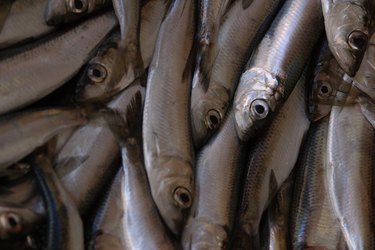
Fish should make regular appearances in your diet, and eating at least 6 ounces of fish a week protects you from cardiovascular disease, explains the Harvard School of Public Health. Anchovies, while perhaps not the most popular fish, make a healthful addition to your diet. Not only do they come packed with beneficial fish oils, they're also low in mercury and contaminants, according to the New York City Department of Health and Mental Hygiene. Add anchovies to your diet as a source of healthy fats, as well as other nutrients that support your health.
Protein and Healthy Fats
Video of the Day
Each 6-ounce portion of fresh anchovies provides you with 35 grams of protein and 8 grams of fat, including 2.5 grams of beneficial omega-3 fatty acids. Protein provides amino acids that your body can use to maintain healthy tissue and aid in immune system function. The omega-3 fatty acids in anchovies support cognitive function, reduce inflammation, support healthy vision and make up a part of your cell membranes. Omega-3 fatty acids also reduce your cardiovascular disease risk, and might play a role in protecting you against Alzheimer's disease.
Video of the Day
Selenium and Calcium
Adding anchovies to your diet boosts your mineral intake and provides you with considerable amounts of calcium and selenium. Calcium is perhaps best known for its role in maintaining bone density, but it also helps your muscles and nerve cells function. Selenium activates enzymes involved in several physiological processes, including thyroid hormone production and blood vessel function. Each 6-ounce serving of fresh anchovies provides you with 62 micrograms of selenium and 250 milligrams of calcium. This makes up your entire daily recommended selenium intake, and one-quarter of your recommended daily calcium intake, according to the Institute of Medicine.
Niacin and Vitamin B-12
You'll also boost your vitamin intake by adding anchovies to your diet. A 6-ounce portion of fresh anchovies provides you with 24 milligrams of niacin -- your entire daily recommended niacin intake -- as well as 1.1 micrograms of vitamin B-12, or 46 percent of your recommended daily B-12 intake, according to the Institute of Medicine. Both niacin and vitamin B-12 play a role in maintaining healthy nervous system function. Low levels of niacin cause depression, fatigue and confusion, while vitamin B-12 deficiency causes nerve damage that negatively affects cognitive functioning and your sense of touch.
Choose Fresh, Not Canned
While fresh anchovies have no nutritional drawbacks, the canned version has one major disadvantage -- its sodium content. Just 1 ounce of canned anchovies contains more than 1,000 milligrams of sodium, or two-thirds of your recommended daily intake limit, according to the Institute of Medicine. Because they're so high in sodium, canned anchovies can contribute to cardiovascular disease and high blood pressure that can damage your kidneys. Raw anchovies, in contrast, contain only a moderate amount of sodium -- 177 milligrams per 6-ounce serving.
Serving Tips
If you're at a loss for how to incorporate anchovies in your diet, try incorporating them into some classics and family favorites. For example, add sauteed grilled anchovies to whole-grain pasta and tomato sauce, or add chunks of fresh anchovy meat to homemade pizzas. If you're feeling more creative, use anchovy's strong flavor to your advantage and use it to flavor casseroles and meats -- tomatoes, black olives, lemon zest, anchovies and seared chicken breast combine in the oven for flavorful and nutrient-packed chicken Provencal.
- New York City Department of Health and Mental Hygiene: Eat Fish, Choose Wisely
- USDA National Nutrient Database: Fish, Anchovy, European, Raw
- Linus Pauling Institute: Essential Fatty Acids
- Iowa State University Extension: Protein
- Linus Pauling Institute: Selenium
- Linus Pauling Institute: Calcium
- Linus Pauling Institute: Vitamin B-12
- Linus Pauling Institute: Niacin
- USDA National Nutrient Database: Fish, Anchovy, European, Canned in Oil, Drained Solids
- Linus Pauling Institute: Sodium (Chloride)
- Harvard School of Public Health: Fish: Friend or Foe